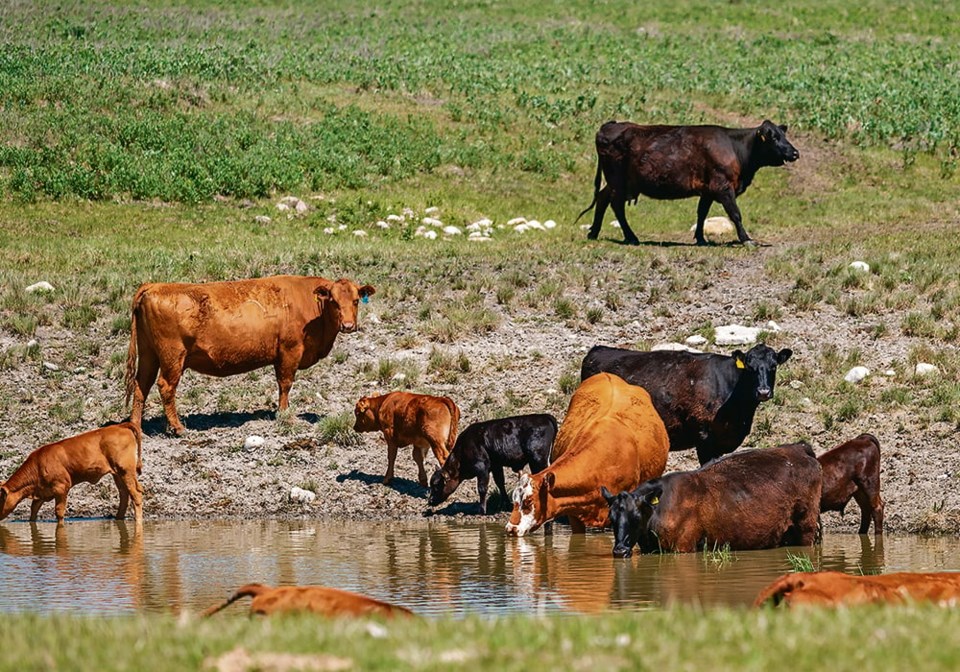Changes need to be made to agricultural disaster relief and business risk management programs to better help beef producers in an era of increasing weather extremes due to climate change, says an industry leader.
Producers can’t continue to keep looking for payouts from the federal and provincial governments every year to bail them out, “so how do we get ahead of it?” said Brodie Haugan, chair of Alberta Beef Producers.
“Let’s be realistic and have an honest approach to this, and that’s the basis of every conversation we’ve had in the last couple of weeks.”
He spoke during an interview Aug. 16 at the four-day Canadian Beef Industry Conference, which was held until Aug. 17 in Calgary. The city implemented water restrictions Aug. 15 after the flow of the Bow River reached its lowest level since 1911, with records set for high temperatures in five southern Alberta communities Aug. 14 due to a heat wave.
Dry conditions and high temperatures across much of the Prairies that began this spring have deepened into severe drought, causing cow-calf producers in affected areas to scramble to find feed for their cattle. Alberta agriculture minister RJ Sigurdson said July 10 that a request had been made to the federal government for a joint AgriRecovery assessment.
However, no decision had yet been made by Ottawa about launching the program in the province, he said in a statement Aug. 18.
“Current drought conditions are making it difficult to maintain the growth in our agriculture industry, which is why I took the opportunity to speak with federal minister of Agriculture and Agri-Food Canada, Lawrence MacAulay, to emphasize the urgent need in Alberta for AgriRecovery disaster relief.”
Haugan said the delay was frustrating for the province’s beef producers, “so we’re just doing everything we can. And a lot of it is trying to figure out that the programs we have in place today, we want to make sure they work and we get money in guys’ pockets to hopefully make good choices because if we wait too long, you don’t have the choice, right?”
AgriRecovery assessments have also been requested by Saskatchewan and British Columbia, with the latter declaring a provincial state of emergency Aug. 18 due to hundreds of wildfires. Tens of thousands of people were evacuated as homes were destroyed.
“First off, I want to address the severe drought and wildfires that are affecting many farmers here in Alberta and across the West, including beef operations,” said MacAuley during a speech Aug. 16 at the conference.
As someone who had been a farmer “for half my life, I have some idea of what farmers and ranchers go through and the problems they have,” he said.
“And I want to help you build the opportunities we have in the sector, expand our trade … and build capacity and create sustainability.”
He said the federal government is “working hand in hand with the provinces on joint assessment, and under AgriRecovery, I’ve urged my department to work through these assessments as quickly as possible with the provinces, understanding how important these dollars are when they come — not enough, but a big help.”
Ottawa is also working closely with Alberta on the AgriStability program, extending the deadline to Sept. 29 from the original one of April 30, he said.
“I want the producers to know that we will continue to be there in these difficult times.”
However, Haugan said many discussions are being held about changing AgriStability to mitigate potential issues in the future “because these aren’t going away. Severe events continue to be a major problem for our industry.”
There are many holes in the program when it comes to beef producers, he said.
“Right now, there’s very little uptake – very little confidence in the system.… it’s just a general conversation right now to try to make a consistent program for all sectors of the agriculture industry that works.”
It includes improving AgriStability for cow-calf producers, who typically don’t have high cash flows, said Haugan.
“It’s how you value labour that isn’t paid. Unpaid family labour is one big one,” he said.
“How do we value inventories that aren’t necessarily ever sold? They just go through your cow herd. How to value grazing lands, the grass that your cow herd is depending on … and when you don’t have grass, how is that truly valued, so that is just some of the initial conversations we’ve been having.”
During a speech Aug. 16 at the conference, Alberta’s deputy agriculture minister, Jason Hale, said provincial officials were advocating for improved business risk management options for the cow-calf sector.
“I know first-hand that many cattle producers have been impacted by this year’s unexpected wildfires, irrigation issues and terribly dry conditions on top of inflation and rising production costs.”
He encouraged Alberta producers to take advantage of provincial initiatives such as the Streamlined Water Assistance Program and Water Pumping Program, as well as the business risk management programs offered by the Agricultural Financial Services Corp.
“We have asked the AFSC to double the low yield threshold for crop insurance to allow alternate uses of crops for feed, and I’ve asked the federal deputy minister to support us in requesting to the Canada Revenue Agency a livestock tax deferral for producers who may have to sell some cows because of the drought.”
Contact



